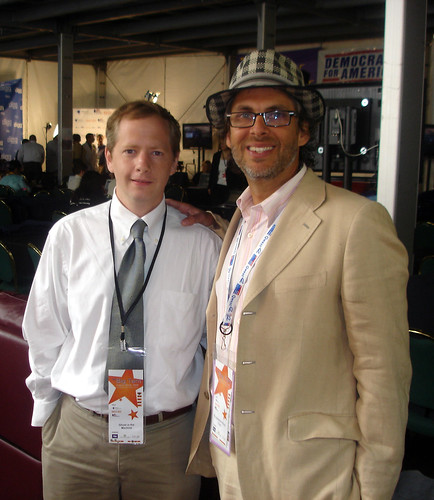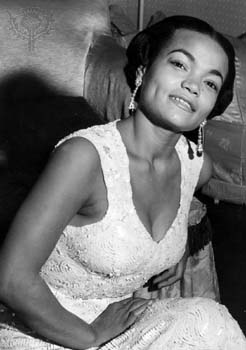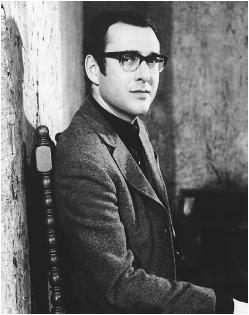“Suspect each moment, for it is a thief, tiptoeing away with more than it brings.” John Updike, 1932-2009.
Tag: Authors
The Playwright and the Muse.
Where’s Wallace?
“DFW was a favorite of mine, and often I turned to his brilliant work to recalibrate my sense of challenging writing: the intelligent, the unexpected, the hilarious, the exasperating. Wallace’s stuff didn’t always work, but it was the real stuff.” To what base uses we may return, Horatio: As broke during my SC sojourn, Infinite Jest author David Foster Wallace chose, for whatever reason, to take arms against his sea of troubles this past week, and by opposing end them. (1962-2008.) I can’t say his voice ever really spoke to me — in fact, much like the output of Paul Thomas Anderson in the film world, I often found his essays wrongheaded and his sprawling, self-referential style actively irritating — but that doesn’t mean his loss isn’t tragic and depressing, and all the more so for being avoidable.
Ed Champion, much more of a DFW fan than I, has compiled a worthy list of authors’ remembrances of the man and his work.
Cavalier & K.

Another happy fanboy moment this morning (See, I don’t only go gaga for character actors and Youtube starlets): While setting up shop for the final day here, I happened to notice author Michael Chabon (Wonder Boys, The Amazing Adventures of Kavalier & Klay, The Yiddish Policemen’s Union) taking a quick peek into the confines of our bloggerverse. (He’s set to sign books at The Tattered Cover, the very quality bookstore next door, in a bit.)
At any rate, Chabon seemed like a very friendly fellow, and he entertained my sudden barrage of fanboy film adaptation questions without complaint. (We didn’t get to talk comics, alas, but then again I didn’t want to eat up all of his exploring time.) Regarding Kavalier & Klay, Chabon said that there’s no real truth to the Jude Law-Ben Stiller rumors that were circulating awhile back, and that the Stephen Daldry-directed version Chabon himself spoke of a few years ago, like the Sydney Pollack attempt before that, is now sadly moldering away in Development Hell. As for Yiddish, Chabon — who seemed really delighted that the Coens have grabbed the project — said they were writing it now (so, in other words, A Serious Man will definitely come first.) No word on casting yet, although I’m willing to bet dollars-to-donuts Frances McDormand is on the short list for Bina.
In any case, Chabon seemed like great people, and it was a real kick to chat him up for a few minutes. (And, unlike a lot of the recognizable folks who’ve come through lately, there was no entourage of “boundary mavens” to negotiate with.)
A Day in the Life.
“Not everything assumes a name. Some things lead beyond words. Art inflames even a frozen, darkened soul to a high spiritual experience. Through art we are sometimes visited – dimly, briefly – by revelations such as cannot be produced by rational thinking.” Alexander Solzhenitsyn, 1918-2008.
From a Dead Man…Greetings.
“What I have wanted most to do…is to make political writing into an art.” By way of Return of the Reluctant, it seems George Orwell’s diary entries will be posted online in blog form beginning August 9, seventy years after he initially wrote them. Welcome to the political blogosphere, George! (And good luck breaking into the TNR-Politico-Atlantic-TPM mutual-regard society.)
Fear and Loathing in Bendy-Bulletland.
In the trailer bin, assassin-prodigy James McAvoy foregoes the doldrums of cubicle life for quality time with Angelina Jolie in the new domestic trailer for Timur Bekmambetov’s Wanted, a.k.a. this summer’s big dumb Matrix-y action flick (and, mind you, I don’t mean that perjoratively in the slightest.) And director Alex Gibney of Enron: The Smartest Guys in the Room and Taxi to the Dark Side takes on the Good Doctor in the new trailer for Gonzo: The Life and Work of Hunter S. Thompson. Not sure if the latter will make it to this area, but I’m looking forward to it.
Into the Mytht.
Robert Asprin, author of the Myth Adventures and Phule’s Company series and a staple of my early fantasy reading, 1946-2008. (By way of Return of the Reluctant.)
It’s not you, it’s your library.
“Pity the would-be Romeo who earnestly confesses middlebrow tastes: sometimes, it’s the Howard Roark problem as much as the Pushkin one. ‘I did have to break up with one guy because he was very keen on Ayn Rand,’ said Laura Miller, a book critic for Salon. ‘He was sweet and incredibly decent despite all the grandiosely heartless “philosophy” he espoused, but it wasn’t even the ideology that did it. I just thought Rand was a hilariously bad writer, and past a certain point I couldn’t hide my amusement.’” In the NYT, Rachel Donadio looks at relationships undone by differing book tastes (and, along the way, quotes a college friend of mine, Christian Lorentzen.)
Funnily enough, my last serious relationship, lo, 18 months ago now, didn’t end because of book taste, but — like Laura Miller above — I always considered the Ayn Rand citation on her Friendster profile an ominous red flag (and, in the clear light of retrospect, I was absolutely correct in this regard.) In the relationship before that, things started out ok, and then, eight or nine months in, we daringly ventured to trade lists of recommended books. At first, all was well: She seemed to dig All the King’s Men, and I finally got around to reading Moby Dick (I liked it, but also found most of it the longest…Atlantic piece…ever…) But we got on shakier ground when I didn’t cotton at all to her favorite tome, Thomas Wolfe’s Look, Homeward Angel. (If you’ve never read it, here’s the short version: I, the protagonist, am more brilliant and tortured than absolutely everybody here in fake-Asheville, NC, and thus noone will ever understand me. After 500 pages of complaining about it, I will leave, and seek my fortune elsewhere.) Meanwhile, she was so embarrassed to be seen with Dan Simmons’ Hyperion — a book I don’t love, but thought might make a good intro to decent sci-fi yarns for someone with highbrow sensibilities, what with all the Chaucer and Keats nods therein — that she’d hide it from people on the train. Whether all this brought about or hastened the end, I know not…but it surely didn’t help. The point being, be wary, young lovers: The book collection can be a minefield, as the Donadio essay attests.
Of Fact and Fiction.
“Historians and novelists are kin, in other words, but they’re more like brothers who throw food at each other than like sisters who borrow each other’s clothes. The literary genre that became known as ‘the novel’ was born in the eighteenth century. History, the empirical sort based on archival research and practiced in universities, anyway, was born at much the same time. Its novelty is not as often remembered, though, not least because it wasn’t called ‘novel.’ In a way, history is the anti-novel, the novel’s twin, though which is Cain and which is Abel depends on your point of view.” By way of The Late Adopter, historian Jill Lepore surveys the origins of — and often-thorny relation between — history and the novel.



